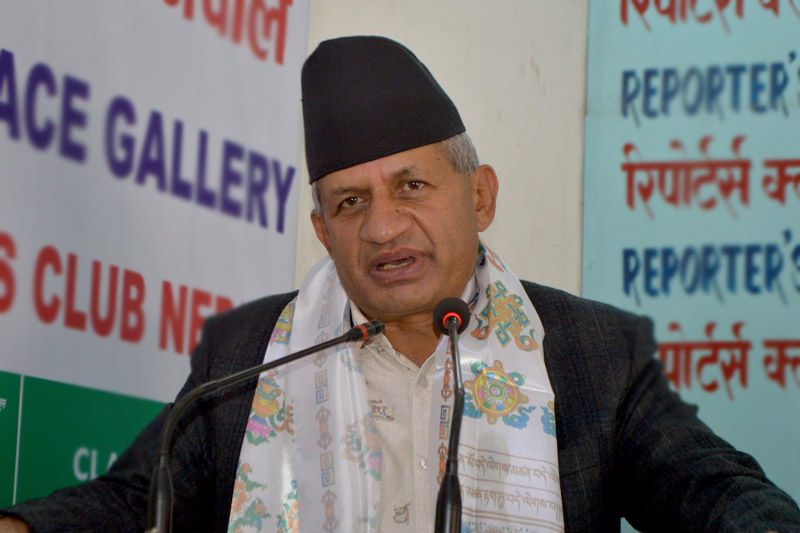Foreign Minister Gyawali leaves for Beijing
Kathmandu, April 16
Minister for Foreign Affairs Pradeep Kumar Gyawali left for Beijing this evening on an official visit at the invitation of State Councillor and Minister of Foreign Affairs of China Wang Yi.
Organising a press conference before his departure, Gyawali said the main objective of his visit to the northern neighbour was to further strengthen bilateral relations and ensure effective implementation of agreements reached in the past.
He also said that high-level visits to and from both the countries would also feature in the talks during his visit to China. On Prime Minister KP Sharma Oli’s yet-to-be-fixed sojourn to Beijing, Gyawali said: “Being friendly neighbours, high-level visits to China from Nepal will obviously take place. However, the exact date has not been fixed yet,” he said.
The foreign minister also said he would convey to the Chinese about the political transformation Nepal had undergone with the completion of three phases of elections, the status of all three levels of governance — local, provincial, and federal — and the new federal government’s foreign policy. Terming the agreements reached in the past with China, including the Trade and Transit Agreement, ‘of historic importance in terms of Nepal’s economic development and bilateral relations’, the minister said the government would work to effectively implement the agreements in a time-bound manner.
“One of the objectives of my China visit is to come up with a concrete outline for the effective implementation of past agreements,” he said, adding that the talks in Beijing would also feature cross-border power transmission lines.
As far as the Belt and Road Initiative is concerned, to which Nepal is a signatory, the minister said infrastructure, connectivity, roads and railway network, energy, and cross-border transmission lines were Nepal’s priority, and the government was working to identify projects that have the potential to accelerate Nepal’s economic growth.
“The talks in Beijing, however, will focus on the modality of implementation of projects under the BRI,” he said. “I believe Nepal will select projects under BRI soon and some programmes will go into the implementation phase immediately.”
Minister Gyawali also said the reopening of Tatopani customs, which has remained closed after the 2015 Gorkha earthquakes, would also feature in his talks in Beijing. “I am hopeful we will soon make some progress on this front,” he said.
Gyawali, however, said that the much-talked-about Budhigandaki hydropower project was not on the agenda for his official visit to China. The previous government led by Sher Bahadur Deuba had scrapped the agreement signed with China’s Gezhouba Group for the construction of the 1,200-MW project in November last year. Pushpa Kamal Dahal-led government had awarded the project’s contact to Gezhouba. “Budhigandaki is not on our agenda. We are currently studying decisions taken by former governments. We will reach a conclusion after we complete our study,” said Gyawali.
Gyawali will reach Beijing tomorrow morning. Ambassador Paudyal will host a welcome reception in honour of Gyawali the same evening.
On April 18, Gyawali is scheduled to meet the Chinese state leader in the morning. Although the Chinese side is yet to finalise the name of the state leader, it will most probably be Premier Li Keqiang or Chinese vice-president Wang Qishan, according to a MoFA official.
After his meeting with the state leader, Gyawali will hold delegation-level talks with Chinese Foreign Minister Wang Yi, which will be followed by a joint press address. Wang Yi will also host a luncheon in honour of the visiting Nepali minister. On April 19, Gyawali will address an event organised by China Reform Forum, a think-tank including experts and those interested in Nepal affairs.
The same evening, Gyawali will leave for Chengdu City of Sichuan Province, where he will meet provincial leaders. He will also address a programme at Sichuan University on April 20. He will return on April 21.






